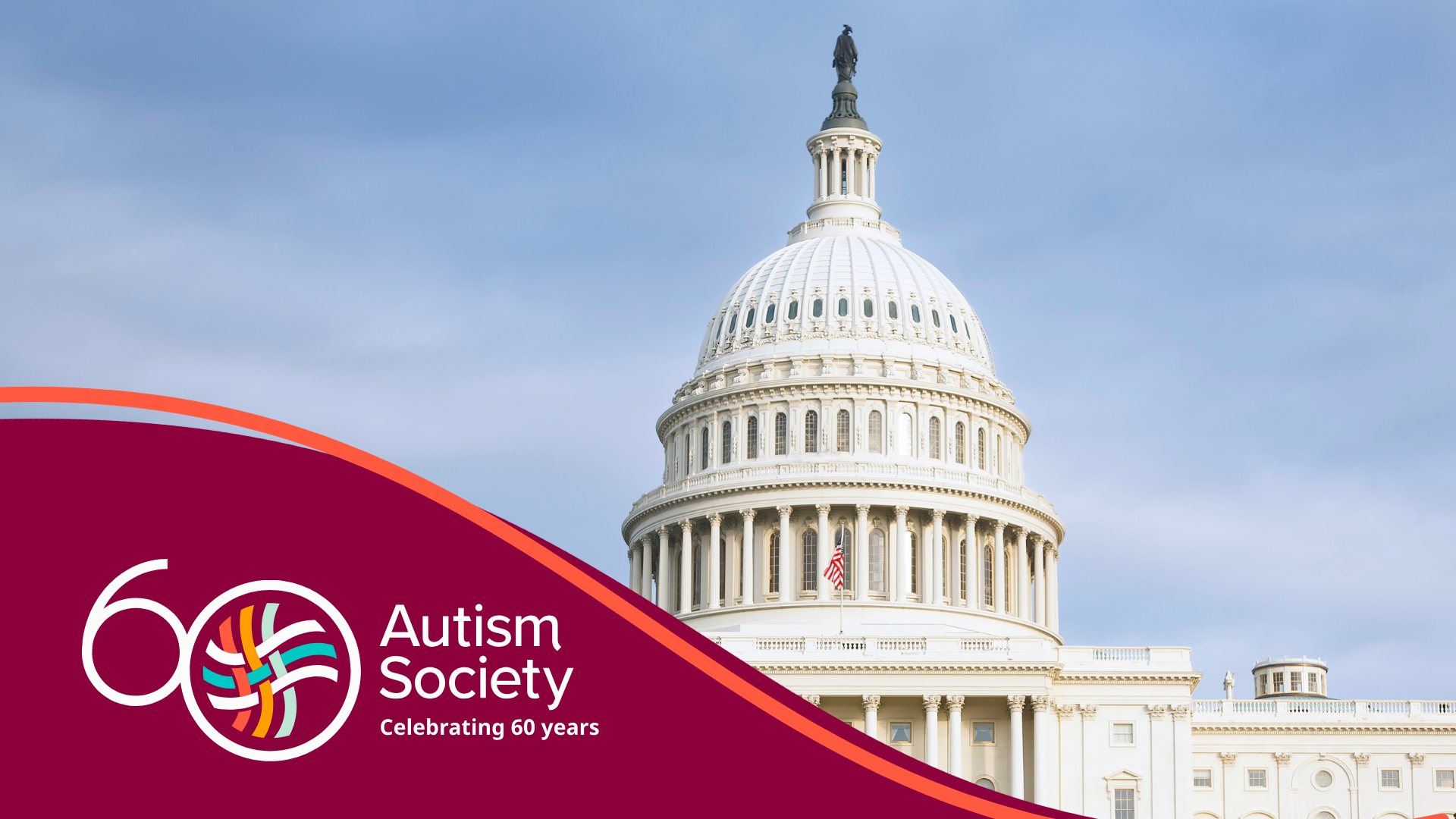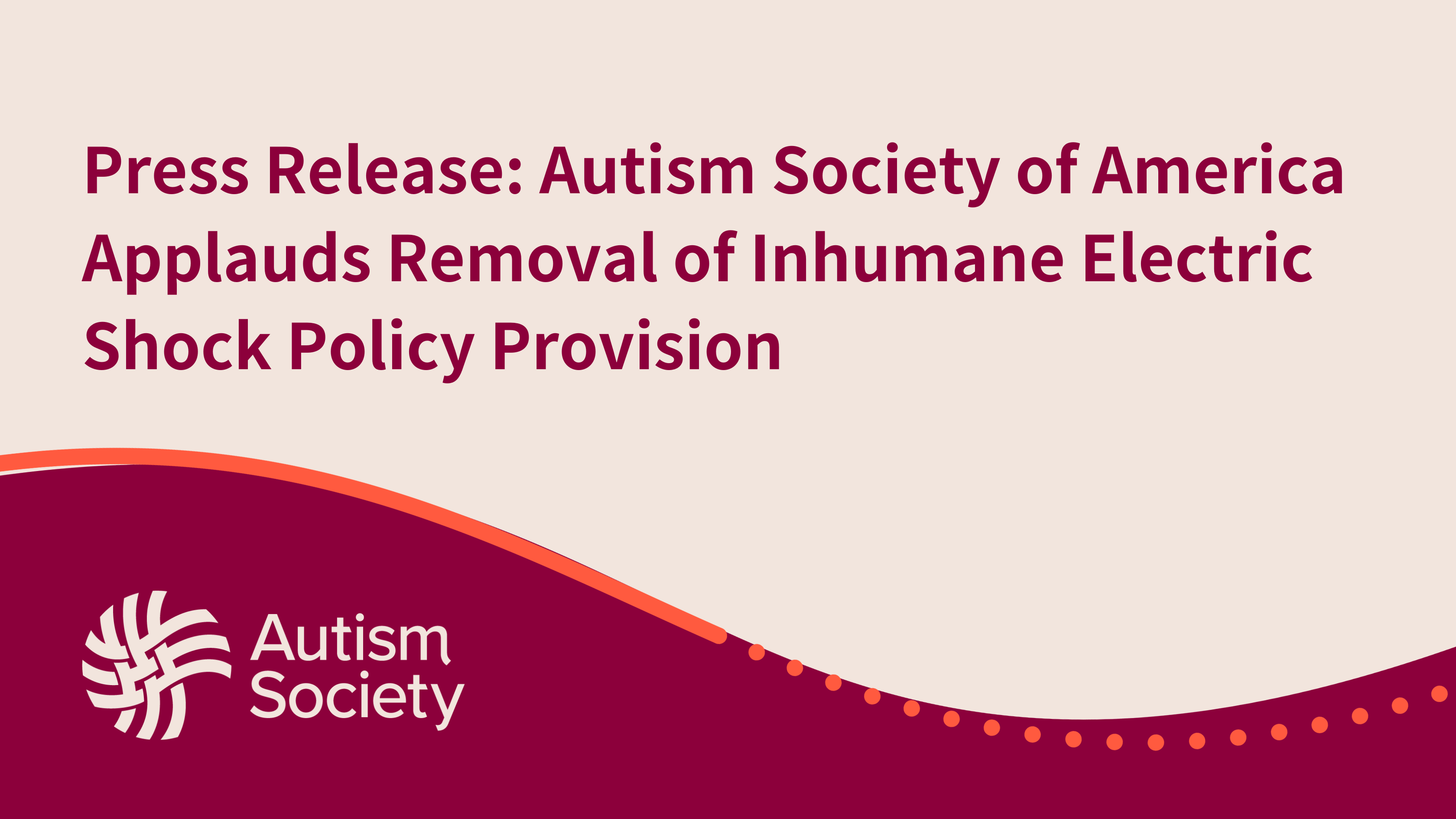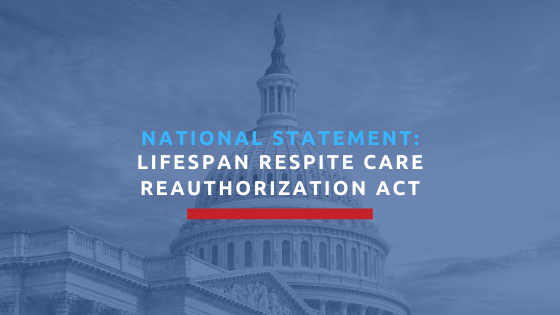
In this issue of Capitol Connection, we bring you key updates on the reconciliation package and its potential impact on Medicaid. You’ll also find the latest developments from the Administration, including the kickoff of the appropriations process and highlights from our recent Autism Round Table. With so much at stake, now is a crucial moment for advocacy. We encourage you to visit the Autism Society’s Action Center to connect with your Members of Congress and advocate for policies that support individuals with Autism and their families.
Reconciliation
The Reconciliation process is moving through Congress, with House Committees advancing their sections of the bill. The Autism Society is closely monitoring provisions from the House Energy and Commerce and Ways and Means Committees.
Energy and Commerce Provisions
The Energy and Commerce Committee bill includes several major changes to Medicaid, including:
- Work requirements for adults without dependents (state-defined exceptions).
- Premiums and cost-sharing allowed for Medicaid enrollees.
- 10% reduction in expansion match rate for states covering individuals not lawfully present.
- Increased redeterminations of eligibility.
- Ban on new provider taxes or rate increases.
According to KFF, these changes could result in 13.7 million people losing coverage by 2034. Combined with reduced federal support and provider tax restrictions, states may struggle to fund optional services like Home and Community-Based Services (HCBS) waivers (see Pluribus News Article and Georgetown analysis). To learn more about how Medicaid is important for the Autism community, see this new research from the Policy Impact Project.
The Autism Society is actively opposing these provisions. We joined over 730 organizations in urging Congress to reject these cuts. Please continue using our Action Alert to contact your Members of Congress.
Ways and Means Provision: Educational Choice for Children Act (ECCA)
The Ways and Means bill includes an increase to the deficit of $20 billion for the Educational Choice for Children Act, offering $5 billion annually in tax credits for donations to Scholarship Granting Organizations. Donors would receive a 1:1 tax credit—up to $5,000 or 10% of adjusted gross income.
This is concerning for the Autism Society and disability community. These private schools are not required to follow Individuals with Disabilities Education Act (IDEA), meaning students with disabilities could lose essential services, rights, and protections.
The Autism Society believes federal funding should strengthen IDEA, not divert resources to schools that aren’t held to the same standards.
Next Steps
Each individual bill has been compiled into a large package that passed out of the House Budget Committee on Sunday May 18th. The package then went to the House Rules Committee where it was passed with some amendments, including a speed up of the work requirements to December 2026 instead of 2029. The package then went to the House floor where it passed 215-214. The next steps are for it to be considered in the Senate. It is expected that Senators will be concerned with multiple aspects including Medicaid and SNAP and will likely make many changes.
Plain Language
Congress is moving a large budget bill through a process called Reconciliation. The Autism Society is watching this because some proposals could harm the autism community.
The bills include changes to Medicaid. These changes include some work requirements, new co-pays, and changes to states funding. Reviews show that 13.7 million people could lose health coverage because of this. The bill also includes a new tax credit program for donations to private school scholarships. These schools are not required to follow the Individuals with Disabilities Education Act (IDEA). The Autism Society is against funding from the Government to private schools.
The full package passed the House Budget Committee on May 18 and will now move to the House Floor. The Senate may change the bills. The Autism Society continues to advocate for protecting Medicaid and IDEA.
FY 26 Appropriations
President’s Budget Request
The President released his skinny budget proposal for Fiscal Year 2026. This is a very broad overview and does not include many details. A more detailed budget proposal is expected to be sent to Congress soon, and the Autism Society is waiting for more details before analysis.
Department Congressional Hearings
Department heads have started to make their visits to the Hill to explain their proposal. The Secretary of the Department of Education and Department of Labor went before Congress to justify their budget request. Secretary of the Department of Education, Linda McMahon, was asked to look closer at the Office of Civil Rights as the skinny budget includes requests for further cuts of up to 50 million dollars. This office is critical for overseeing the enforcement of IDEA and Section 504.
After the more detailed budget is shared by the Administration, the Committees will begin marking up their bills to fund FY26. The Autism Society is continuing to advocate for the highest level of funding for Developmental Disability programs, Autism programs and research, the Individuals with Disabilities Education Act, and additional relevant programs.
The Secretary of Health and Human Services Secretary Robert F. Kennedy Jr. testified before several Congressional committees. The Autism Society submitted written statements for each hearing. Autism was mentioned several times by lawmakers from both parties.
- Senator Hassan (D-NH) asked about David Geier’s involvement in autism research. Kennedy explained that Geier is a contractor reviewing vaccine safety.
- Senator Banks (R-IN) asked about the national autism registry, which Kennedy said will be voluntary, with opt-in/opt-out options and privacy protections.
- Banks also asked about environmental toxins. Kennedy responded that he believes environmental toxins are driving the rise in autism rates.
Autism Roundtable

Advocates gathered at the Autism Roundtable
Kennedy’s hearings followed a groundbreaking roundtable led by major Autism organizations to discuss Autism services, civil rights, scientific integrity, and disability representation in federal policy. The Health and Human Services Secretary was invited but did not attend; instead, Mary Lazare, a top official from the Administration for Community Living, was present. The roundtable focused on key issues:
- harmful cuts to programs like Medicaid
- the lack of services for Autistic people with complex needs
- the need for inclusive education
- research aligned with community needs, such as on services and supports
- communication access as a human right
- promoting unity in the Autism community over divisive narratives
Plain Language
The President released a small budget plan for 2026, with more details coming soon. Agency leaders have begun meeting with Congress to explain their funding requests. The Autism Society is waiting for the full budget before reviewing. We keep asking for strong money for Autism programs.
Secretary of Health and Human Services Robert F. Kennedy Jr. went to Congress to talk about the budget. Lawmakers asked about causes of Autism and a Autism registry. This was after a Autism roundtable led by advocacy groups focusing on how to help people with Autism. Secretary Kennedy did not attend the roundtable, but another staff member did.
New GAO Report on Subminimum Wage
The Government Accountability Office (GAO) released a new report that reviews outcomes for Colorado and Oregon after they phased out the use of subminimum wage waivers. Some key findings from the report include that half of individuals transitioned into competitive integrated employment and the other half are receiving day services under Medicaid. There are now 18 states that have phased out the use of subminimum waivers: New Hampshire, Maryland, Texas, Alaska, Maine, Oregon, Washington, Hawaii, Colorado, California, Delaware, Tennessee, South Carolina, Rhode Island, Illinois, Virginia, Nevada, and Massachusetts. The Autism Society continues to support federal initiatives to stop the certification of these submimum wage waivers.
Plain Language
There is a new report from the Government on what happened in Colorado and Oregon. These states stopped paying people with disabilities less than minimum wage. The report said that about half of the people went into regular jobs with fair pay. The other half gets support through Medicaid day programs. 18 states have stopped paying less than minimum wage.
State Advocacy
Illinois Executive Order
Illinois Governor JB Pritzker signed an Executive Order on May 7 aimed at protecting individuals from unauthorized data collection and sharing by state agencies. The order ensures that autism-related information is only used when necessary and with informed consent. This action responds to growing national concerns about proposals to establish federal autism registries or databases without clear legal protections or oversight. Stephanie Brown, Executive Director of the Southern Illinois Autism Society was quoted in the Press Release sharing that “This is a win for privacy, inclusion, and progress, we’re grateful the Governor is listening to the autism community and taking concrete action.”
Plain Language
Illinois’s Governor signed an order to protect people’s private autism information. It says only the state can collect and share autism data with the Government if the person says yes. This is because people worry about the government’s plans to create autism databases.
Share:






